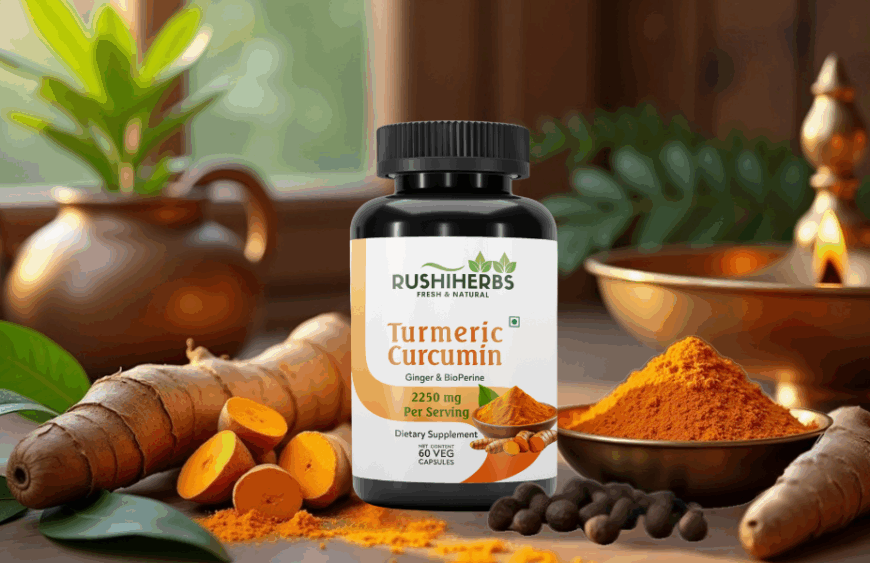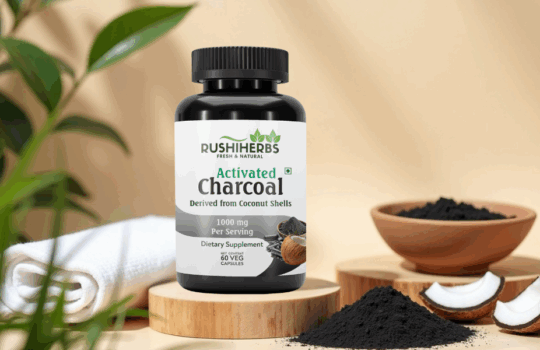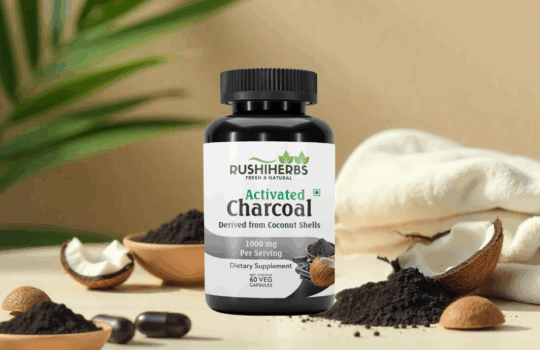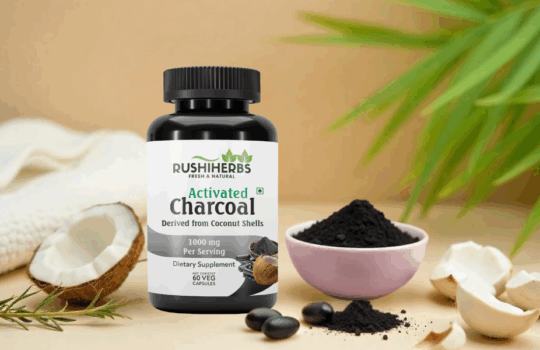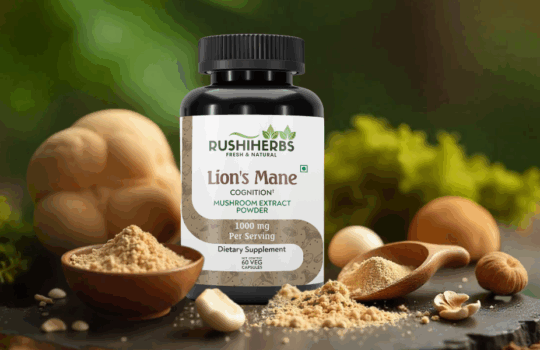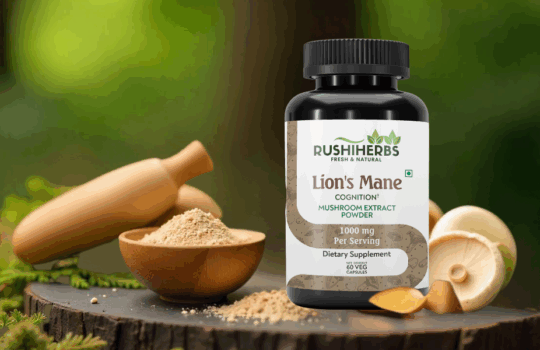Introduction
In recent years, the connection between gut health and immune function has gained tremendous attention in the medical and wellness communities. The gut is often called the “second brain” and a critical hub of your immune system. An imbalance or inflammation in the gut can lead to a weakened immune response, making the body more vulnerable to infections, autoimmune diseases, and chronic illnesses.
Enter turmeric and its active compound curcumin—time-tested natural agents renowned for their powerful anti-inflammatory, antioxidant, and immune-boosting properties. When consumed in an optimized form such as Rushi Herbs Turmeric and Curcumin Capsules, they offer profound benefits to gut health and immune resilience.
This article explores the intricate gut-immune relationship and unveils how turmeric and curcumin capsules can support a healthier gut, a stronger immune system, and overall well-being.
Understanding the Gut Health Connection
The Gut: The Largest Immune Organ
The human gastrointestinal tract is home to trillions of microbes—collectively known as the gut microbiome—that play an essential role in digestion, nutrient absorption, and immune regulation. Approximately 70% of the immune system resides in the gut-associated lymphoid tissue (GALT). This complex immune network is responsible for distinguishing harmful pathogens from harmless substances, preventing infections while maintaining tolerance to food and beneficial microbes.
What Happens When Gut Health Declines?
Factors such as poor diet, stress, antibiotics, infections, and chronic inflammation can disrupt the delicate balance of gut microbiota—a condition known as dysbiosis. This imbalance can trigger:
- Increased intestinal permeability (leaky gut), allowing toxins and pathogens to enter the bloodstream
- Chronic low-grade gut inflammation
- Impaired immune function, leading to increased susceptibility to infections and autoimmune disorders
Maintaining gut health is therefore crucial for a balanced and effective immune response.
Turmeric and Curcumin: Natural Warriors for Gut and Immune Health
What Is Turmeric and Curcumin?
Turmeric (Curcuma longa) is a bright yellow spice commonly used in Indian cuisine and traditional medicine. The compound curcumin is turmeric’s primary active ingredient responsible for its therapeutic benefits. Curcumin exhibits potent anti-inflammatory, antioxidant, and immune-modulating effects.
How Turmeric Supports Gut Health
- Reduces Gut Inflammation:
Curcumin inhibits inflammatory pathways such as NF-kB and cytokine production, which are often elevated in gut disorders like inflammatory bowel disease (IBD), ulcerative colitis, and Crohn’s disease. - Improves Microbiome Diversity:
Studies indicate curcumin can foster the growth of beneficial bacteria such as Lactobacillus and Bifidobacterium, which promote a healthy intestinal environment. - Strengthens Gut Barrier Function:
By reducing inflammation and oxidative stress, turmeric helps maintain tight junction proteins in the gut lining, reducing permeability and preventing leaky gut.
Turmeric’s Impact on Immunity
- Modulates Immune Cell Activity: Curcumin enhances the function of immune cells such as macrophages, natural killer cells, and T-cells, ensuring a balanced immune response.
- Antimicrobial Effects: Turmeric has been shown to inhibit the growth of bacteria, viruses, and fungi, providing a natural defense against infections.
- Antioxidant Protection: By neutralizing free radicals, curcumin reduces oxidative stress, a major cause of immune dysfunction.
Health Conditions Linked to Gut Inflammation and Immune Dysfunction
Understanding how gut inflammation impacts immunity sheds light on the broad benefits of turmeric supplementation.
1. Autoimmune Diseases
Dysregulated immune responses triggered by a leaky gut can lead to autoimmune conditions such as rheumatoid arthritis, type 1 diabetes, and multiple sclerosis.
2. Allergies and Asthma
Chronic gut inflammation alters immune tolerance, increasing the risk of allergies and asthma.
3. Frequent Infections
An impaired gut immune barrier lowers resistance to bacterial and viral infections.
4. Digestive Disorders
IBD and IBS symptoms worsen with unchecked gut inflammation.
Scientific Evidence Supporting Turmeric’s Role in Gut and Immune Health
Numerous clinical and preclinical studies validate turmeric and curcumin’s gut-immune benefits:
- A 2019 review in Frontiers in Immunology highlighted curcumin’s ability to improve intestinal inflammation by modulating cytokine profiles and gut microbiota.
- A 2020 clinical trial showed that curcumin supplementation reduced relapse rates in ulcerative colitis patients.
- Research in the Journal of Medicinal Food demonstrated curcumin’s enhancement of macrophage and T-cell activity, boosting immune defense.
These findings align with centuries of Ayurvedic use, confirming turmeric’s dual role as a gut soother and immune enhancer.
Why Choose Rushi Herbs Turmeric and Curcumin Capsules?
When selecting turmeric supplements, bioavailability is key since curcumin is poorly absorbed on its own.
Rushi Herbs Turmeric & Curcumin Capsules stand out because:
- High Potency: Each serving delivers 2250 mg of turmeric with a standardized curcumin content.
- Enhanced Absorption: Formulated with black pepper extract (piperine) to increase curcumin absorption by up to 2000%.
- Pure and Clean: Free from GMOs, additives, and artificial fillers.
- Third-Party Tested: Ensures quality, potency, and safety.
This premium formulation ensures you get maximum gut and immune support from every capsule.
How to Incorporate Turmeric Capsules into Your Wellness Routine
Dosage and Usage Tips
- Take 2 capsules daily with meals to enhance absorption and reduce potential stomach upset.
- Combine supplementation with a gut-friendly diet rich in fiber, fermented foods, and antioxidants.
- Stay hydrated and manage stress to optimize gut and immune function.
Precautions
- Consult your healthcare provider before use if you are pregnant, nursing, or on blood-thinning medications.
- Avoid excessive doses to prevent gastrointestinal discomfort.
Complementary Lifestyle Tips for Gut Health and Immunity
For best results, pair turmeric supplementation with these lifestyle habits:
- Eat a diverse, plant-rich diet: Supports a healthy microbiome.
- Manage stress: Chronic stress impairs immunity and gut integrity. Practices like yoga and meditation can help.
- Get regular exercise: Physical activity promotes gut motility and immune balance.
- Prioritize sleep: Sleep deprivation disrupts gut microbes and weakens immune defenses.
Conclusion: Harness the Power of Turmeric for a Resilient Gut and Strong Immune System
Your gut health and immune system are deeply intertwined, influencing your overall vitality and resistance to disease. Chronic gut inflammation disrupts this balance, but nature provides a potent solution: turmeric and curcumin.
By choosing a high-quality supplement like Rushi Herbs Turmeric and Curcumin Capsules, you can nurture your gut microbiome, reduce inflammation, and bolster your immune defenses. This natural approach supports your body’s ability to heal and thrive—helping you enjoy better health, vitality, and protection from illness.
Ready To Improve Gut Health :
1. How exactly does turmeric support gut health?
Turmeric contains curcumin, a bioactive compound known for its anti-inflammatory and antioxidant properties. In the gut, curcumin helps reduce inflammation by blocking inflammatory markers such as NF-κB and cytokines. It also supports the gut lining by maintaining the integrity of tight junctions, which helps prevent leaky gut syndrome. Additionally, curcumin has been shown to encourage the growth of beneficial gut bacteria, contributing to microbiome balance and digestive health.
2. Can turmeric and curcumin capsules improve immune function?
Yes, turmeric and curcumin can significantly improve immune function. Curcumin modulates both the innate and adaptive immune systems by enhancing the activity of T-cells, B-cells, macrophages, and natural killer cells. It also reduces pro-inflammatory cytokines and oxidative stress, helping the immune system respond appropriately without becoming overactive or weakened.
3. What are the signs of poor gut health that turmeric might help with?
Signs of compromised gut health include bloating, gas, constipation, diarrhea, food sensitivities, fatigue, skin issues, and brain fog. Chronic stress, poor diet, and frequent antibiotic use can lead to gut dysbiosis and inflammation. Turmeric capsules can help reduce inflammation, support healthy digestion, and restore microbial balance in the gut.
4. How long does it take for turmeric capsules to improve gut and immune health?
The time it takes to experience benefits can vary by individual. Most people report noticeable improvements in digestion, inflammation, or immune resilience within 4 to 8 weeks of consistent daily use. Factors like diet, lifestyle, and the severity of the initial condition can influence how quickly results are seen.
5. Are turmeric and curcumin capsules safe for long-term use?
Turmeric and curcumin are generally safe for long-term use when taken in recommended doses. High-quality supplements like Rushi Herbs Turmeric and Curcumin Capsules are formulated with natural ingredients and enhanced with black pepper extract for better absorption. However, individuals with gallbladder issues, bleeding disorders, or those on anticoagulants should consult a healthcare provider before long-term use.
6. Why is black pepper (piperine) included in turmeric supplements?
Curcumin has low natural bioavailability, meaning it’s poorly absorbed in the bloodstream. Piperine, the active compound in black pepper, enhances curcumin absorption by up to 2000%. This combination ensures your body receives the maximum health benefits from turmeric supplementation.
7. Can turmeric help with autoimmune and inflammatory gut conditions like IBD or IBS?
Yes, turmeric has shown promising results in managing inflammatory bowel conditions like Crohn’s disease, ulcerative colitis, and IBS. Its ability to reduce inflammation, soothe the gut lining, and regulate immune responses makes it beneficial for people with autoimmune and inflammatory gut disorders. Clinical studies have demonstrated fewer flare-ups and reduced symptoms in patients using curcumin supplementation.
8. How do turmeric capsules affect the gut microbiome?
Turmeric and curcumin positively influence the gut microbiome by promoting the growth of beneficial bacteria and inhibiting harmful microbes. Curcumin can modulate the microbial composition by supporting strains like Lactobacillus and Bifidobacterium, which are essential for gut health and immune function. A healthy microbiome also enhances nutrient absorption and mental clarity.
9. Are there any dietary or lifestyle changes that enhance turmeric’s effects on gut and immune health?
Yes, pairing turmeric supplementation with the following practices can boost results:
- Eat a fiber-rich diet: Whole grains, fruits, and vegetables feed good bacteria.
- Include fermented foods: Yogurt, kefir, sauerkraut, and kimchi support the microbiome.
- Stay hydrated: Water helps flush toxins and supports gut motility.
- Manage stress: Chronic stress damages gut lining and weakens immunity.
- Sleep well and exercise regularly: Both habits support digestive and immune function.
10. How do I choose the best turmeric and curcumin supplement for gut and immune health?
Look for a supplement that meets the following criteria:
- High potency turmeric extract (curcumin 95%)
- Enhanced bioavailability (with piperine/black pepper)
- Clean label (non-GMO, gluten-free, no fillers)
- Third-party tested for purity and potency
Rushi Herbs Turmeric and Curcumin Capsules – 2250 mg meets all these standards, making it a trusted choice for gut and immune support.

